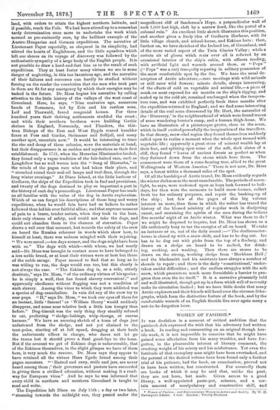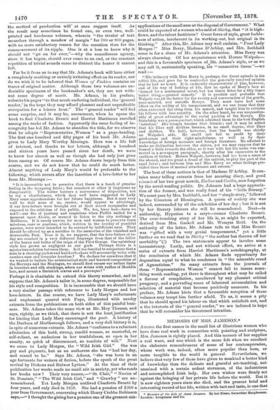WOMEN OF FASHION" IT was doubtless in a moment of
critical ambition that the patriarch Job expressed the wish that his adversary had written a book. In reading and commenting on an original though hos- tile work, it is not impossible to conceive that he might have gained some alleviation from his many troubles, and have for- gotten, in the pleasurable interest of literary comment, the crushing weight of his misery and his misfortunes. Yet even the fortitude of that exemplary man might have been overtasked, and the perusal of the desired volume have been found only a further trial of his patience, had the book, on examination, proved not to have been written, but constructed. For assuredly there are books of which it may be said that, unlike the poet, they are not born, but made. Given access to a good library, a well-appointed paste-pot, scissors, and a cer- tain amount of manipulatory and constructive skill, and
• Women of Fashion; and Representative Women in Letters and Society. By W. H. Davenport Adams. 2 vole. London : Tinsley Brothers.
the method of production will at once suggest itself. As the result may sometimes be found one, or even two, well- printed and handsome volumes, wherein "the rivulet of text meanders through a meadow of margin " for 700 or 800 pages, with no more satisfactory reason for the cessation than for the commencement of its ripple. One is at a loss to know why it should not "go on for ever,"—why the somniferous agency, since it has begun, should ever come to an end, or the constant repetition of trivial sounds cease to distract the hearer it cannot lull.
Far be it from us to say that Mr. Adams's book will have either a completely soothing or entirely irritating effect on its reader, nor do we wish it to be inferred that Women of Fashion contains no traces of original matter. Although these two volumes are un- deniable specimens of the bookmaker's art, they are not with- out some degree of merit. Mr. Adams, in his preface, submits his pages "to that much-enduring individual, the 'general reader,' in the hope they may afford pleasant and not unprofitable occupation for a leisure hour." The "general reader" will feel some surprise, and it may be, amusement, when he opens the
book to find Charlotte Bront6 and Harriet Martineau enrolled among the ranks of fashion. Apparently the same feeling of in- congruity has led Mr. Adams to abandon the title, for we observe that he adopts " Representative ,Women " as a page-heading. The first one hundred and fifty pages of his book Mr. Adams gives to Lady Mary 'Wortley Montagu. Hers was a life full of interest, and thanks to her letters, although a hundred and sixteen years have passed since her death, we seem to know her almost as well as though she had only just gone from among us. Of course Mr. Adams draws largely from this source, and we do not know that he could do much better. Almost anything of Lady Mary's would be preferable to the following, which occurs after the insertion of a love-letter to her from Mr. Montagu :-
" It is impossible not to perceive that there is a touch of genuine feeling in the foregoing letter; but somehow or other it impresses us disagreeably. The writer betrays a moroseness of disposition, not to say a churlishness, which may well have suggested to Lady Mary some apprehensions for her future happiness. But it may very well be that none of us, reader, would appear to advantage, if our love-letters were brought out of their secret receptacles and exposed to the criticism of the public. We, too, have had—have we not ?—our fits of jealousy and suspicions when Phillis smiled for a moment upon Alexis, or seemed to listen to the airy nothings of Melibcens. It is surely unwise for men and woman to preserve these missives, once so precious, which, written in the heyday of youthful passion, were never intended to be scanned by indifferent eyes. They should be offered up as a sacrifice to the memories of the vanished and irrevocable Past. True it is, we suppose, that the love-letters of to- day are couched in a very different language from that of the billets of the beaux and belles of the reign of the First George. Our epistolary style has grown as negligent as our garb. Perhaps there is a mysterious relation between them. Is it too fanciful to conjecture that a man in a shooting-jacket and knickerbockers will necessarily write with careless ease and irregular freedom ? We declare for ourselves that if we wanted to imitate the aristocratical style and learned composition of the Herveys and the Montagne, we should first encase our nether limbs in breeches and silk stockings, adorn our wrists with ruffles of Mechlin lace, and mount a Steinkirk cravat and a perruquel" Perhaps it is charitable to extend this theory somewhat, and to suppose that Mr. Adams's tailor is, in some degree, responsible for his style and composition. It is inexcusable that we should have a very similar passage with reference to Lady Morgan and her love-letters. In due course, we have Lady Mary's unfortunate and unpleasant quarrel with Pope, illustrated with sundry extracts from the publications on both sides of this painful busi- ness. Mr. Adams takes the same view as Mr. Mop Thomas, and says, rightly, as we think, that there is not the least; justification for hinting that Lady Mary encouraged the poet. A history of the Duchess of Marlborough follows, and a very dull history it is, in spite of numerous extracts. Mr. Adams "confesses to a reluctant admiration of this bold, strong, candid woman, so masterful, so self-reliant, so audacious in her truthfulness, so open in her enmity, so quick of discernment, so resolute of will." Next we come to Lady Morgan, the " Wild Irish Girl." She was gay and piquante, but as an authoress she has " had her day, and ceased to be." Says Mr. Adams, "she was born in an age fortunate for writers of fiction, before the epoch of the great revival by Dickens and Bulwer Lytton." At the time of their publication her works made no small stir in society, yet who reads her books now ? Their very names,—" St. Clair," " Novice of St. Dominic," " The Wild Irish Girl," and " Crawley " are un- remembered. Yet Lady Morgan outlived Charlotte Bronth by four years, and only died in 1859. She had a pension of £300 a year from Government, concerning which Henry Crabbe Robinson says,—" I thought the giving her a pension one of the grossest mis- applications of the small sum at the disposal of Government." What could be expected of a woman who said of Shirley, that " it is high- flown, and the talent factitious? Great force of style, great feeble- ness of action, incoherent in its working-out, but original in its- thinking." After this, Mr. Adams may well exclaim, " Poor Lady Morgan !" Miss Berry, Madame D'Arblay, and Mre. Inchbald come in for a share of Mr. Adams's attention. Miss Berry was always charming. Of her acquaintance with Horace Walpole— and this is a favourable specimen of.Mr. Adams's style, or as we may call it, anatomically speaking, his " connective tissue "—we read :— " His intimacy with Miss Berry is, perhaps, the finest episode in his selfish life, and goes far to contradict the generally received opinion. that he had no heart. It is eminently characteristic of him, however, and of his way of looking at life, that he spoke of Mary's face as ' formed for a sentimental novel, but ten times fitter for a fifty times bettor thing,—genteel comedy.' It is possible and probable that Walpole was all the better for the society and conversation of the gentle, pure-minded, and amiable Berrys. They must have had some effect on the acidity of his temperament, and we can fancy that they often extracted the sting from his speech, and taught him to criticise his fellows with less asperity. On the other hand, he was unquestion- ably of great advantage to the social position of the Berrys. His friendship was a passe-partout, which admitted them to the best English interiors.' //is friends became their friends ; and it may be added that his likes and dislikes became, in no small degree, their likes and dislikes. Wo hold, however, that the benefit was chiefly- on Walpole's side. He could not fail to profit by their- good-sense and their right-mindedness, as well as by their knowledge of foreign manners and foreign literature. He affected to make no distinction between the sisters, yet we may suppose that he leaned a little towards the older, as it was with her his name was con- nected in a newspaper paragraph, shortly after his succession to the earldom of Orford. Horace Walpole, however, had too keen a sense of the absurd, and too great a dread of the satirist, to play the part of the aged lover ; and between him and Miss Berry no other feelings pre- vailed than those of mutual attachment and esteem."
The best of these notices is that of Madame D'Arblay. It con- tains many telling extracts from her amusing diary, and good résumés of her two great novels, Evelina and Cecilia, now forgotten by the novel-reading public. Dr. Johnson had a huge apprecia- tion of the former, and was really fond of his " little Burney." We must pass by Mrs. Inchbald, and her " simple story," followed by the Countess of Blessington. A queen of society she was indeed, surrounded by all the celebrities of her day ; but it is not by her literary labours she will be remembered. Next—in authorship, Hyperion to a satyr—comes Charlotte Brontë. The ever-touching story of her life is, as might be expected, derived from Mrs. Gaskell and Mr. Wemyss Reid. On the authority of the latter, Mr. Adams tells us that Miss Bront6 was "gifted with a very genial temperament," yet a little further on we read that in Shirley " the author has thrown off her morbidity "(!) The two statements appear to involve some inconsistency. Lastly, and not without effort, we arrive at a series of extracts from Harriet Martineau's autobiography, at the conclusion of which Mr. Adams finds opportunity for dogmatism equal to what he condemns in " the miserable creed of Agnosticism." So many extracts from the journals of these " Representative Women " cannot fail to insure some- thing worth reading, yet there is throughout what may be called a flavour of compilation, unrelieved by any pleasant critical pungency, and a pervading sense of laboured accumulation and selection of material that become positively nauseous. In his preface, Mr. Adams hints that a favourable reception of these volumes may tempt him further afield. To us, it seems a pity that he should spend his labour on that which satisfieth not, and n the interests of the " general reader," we are induced to hope that he will reconsider his threatened intention.



































 Previous page
Previous page